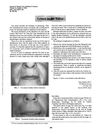 10 citations,
September 2021 in “International Journal of Nanomedicine”
10 citations,
September 2021 in “International Journal of Nanomedicine” Tiny particles called extracellular vesicles show promise for treating skin conditions and promoting hair growth.
[object Object]  6 citations,
February 2023 in “Biomaterials Research”
6 citations,
February 2023 in “Biomaterials Research” Special gels help heal diabetic foot sores and reduce the risk of amputation or death.
 5 citations,
October 2022 in “Phenomics”
5 citations,
October 2022 in “Phenomics” Your skin is like an ecosystem, with its own community of microbes and substances that interact and affect its health.
 September 2023 in “Current opinion in microbiology”
September 2023 in “Current opinion in microbiology” Certain fungi protect skin health, but changes can allow harmful fungi to cause serious infections, needing more research for treatment and control.
 August 2023 in “Bioengineering”
August 2023 in “Bioengineering” Bioprinting could greatly improve health outcomes but faces challenges like material choice and ensuring long-term survival of printed tissues.
 March 2024 in “Indian Journal of Dermatology/Indian journal of dermatology”
March 2024 in “Indian Journal of Dermatology/Indian journal of dermatology” Exosomes could be key in treating skin conditions and healing wounds.
 39 citations,
March 2003 in “The Veterinary clinics of North America. Small animal practice/Veterinary clinics of North America. Small animal practice”
39 citations,
March 2003 in “The Veterinary clinics of North America. Small animal practice/Veterinary clinics of North America. Small animal practice” Behavioral dermatology treats skin problems by considering both emotional and physical factors.
2 citations,
May 2023 in “Frontiers in Pharmacology” Natural products may help treat skin inflammation from abnormal adrenal hormones.
 54 citations,
June 1990 in “Journal of The American Academy of Dermatology”
54 citations,
June 1990 in “Journal of The American Academy of Dermatology” HIV can cause various severe or unusual skin conditions that help indicate the presence and stage of the disease.
 48 citations,
July 2002 in “Journal of Cutaneous Medicine and Surgery”
48 citations,
July 2002 in “Journal of Cutaneous Medicine and Surgery” Skin problems are common and important signs of eating disorders and treating the eating disorder can improve these skin conditions.
 33 citations,
April 2002 in “Journal of Cutaneous Medicine and Surgery”
33 citations,
April 2002 in “Journal of Cutaneous Medicine and Surgery” Eating disorders can cause skin problems that need treating the underlying condition for better health.
 75 citations,
May 1986 in “Clinics in endocrinology and metabolism”
75 citations,
May 1986 in “Clinics in endocrinology and metabolism” Male hormones are important for hair and oil gland development and can cause conditions like excessive hair growth and acne.
 70 citations,
August 2020 in “Nanomaterials”
70 citations,
August 2020 in “Nanomaterials” Electrospun nanofibers show promise for enhancing blood vessel growth in tissue engineering but need further research to improve their effectiveness.
 49 citations,
December 2009 in “Journal of Investigative Dermatology”
49 citations,
December 2009 in “Journal of Investigative Dermatology” Thyroid function affects skin health, with a complex interaction between the two.
 19 citations,
November 2011
19 citations,
November 2011 Using systemic drugs as creams for skin conditions shows promise, but more research is needed to confirm their effectiveness and safety.
 17 citations,
January 2011 in “Indian journal of dermatology, venereology, and leprology”
17 citations,
January 2011 in “Indian journal of dermatology, venereology, and leprology” A rare genetic skin condition usually affecting males was found in a 9-year-old girl.
 10 citations,
January 1985 in “Elsevier eBooks”
10 citations,
January 1985 in “Elsevier eBooks” Active oxygen species might be involved in skin tumor growth, but their exact role is unclear.
 1 citations,
January 2016 in “Elsevier eBooks”
1 citations,
January 2016 in “Elsevier eBooks” The document concludes that a complete skin restoration biomaterial does not yet exist, and more clinical trials are needed to ensure these therapies are safe and effective.
88 citations,
April 1981 in “Molecular and cellular biochemistry” [object Object]  26 citations,
January 2007 in “Organogenesis”
26 citations,
January 2007 in “Organogenesis” Bioengineering can potentially treat hair loss by regenerating hair follicles and cloning hair, but the process is complex and needs more research.
January 2022 in “Clinical dermatology review” A girl with a rare skin condition called Keratosis Follicularis Spinulosa Decalvans showed no significant improvement with treatment.
 1 citations,
December 1996 in “Journal of Clinical Laser Medicine & Surgery”
1 citations,
December 1996 in “Journal of Clinical Laser Medicine & Surgery” A doctor describes a new, less expensive method for treating skin issues with a laser, and another doctor corrects a false claim about hair transplantation results.
 253 citations,
April 2014 in “Drugs”
253 citations,
April 2014 in “Drugs” Teriflunomide helps reduce multiple sclerosis symptoms and is safe for most patients.
 60 citations,
February 2010 in “Gynecological Endocrinology”
60 citations,
February 2010 in “Gynecological Endocrinology” Metformin combined with lifestyle changes improves insulin resistance and reduces testosterone levels in women with PCOS more than lifestyle changes alone.
 32 citations,
February 2008 in “Journal of the American Academy of Dermatology”
32 citations,
February 2008 in “Journal of the American Academy of Dermatology” KFSD is a genetic disorder causing hair loss and skin issues, with no effective treatment.
 19 citations,
July 2013 in “The obstetrician & gynaecologist”
19 citations,
July 2013 in “The obstetrician & gynaecologist” The document concludes that careful evaluation is needed to diagnose PCOS correctly due to similar symptoms in other conditions, and accurate testosterone level measurement is crucial.
15 citations,
March 1996 in “PubMed” Anorexia nervosa may cause a hair defect called pili torti due to malnutrition and high vitamin A levels.
 10 citations,
April 2015 in “Netherlands Heart Journal”
10 citations,
April 2015 in “Netherlands Heart Journal” The conclusion is that there's no significant link between male pattern baldness and the severity of coronary artery disease.
Certain medications, especially 5-alpha reductase inhibitors, are commonly linked to erectile dysfunction.
 1707 citations,
December 2003 in “The New England Journal of Medicine”
1707 citations,
December 2003 in “The New England Journal of Medicine” Combination therapy of doxazosin and finasteride safely and effectively reduces benign prostatic hyperplasia progression risk.

























